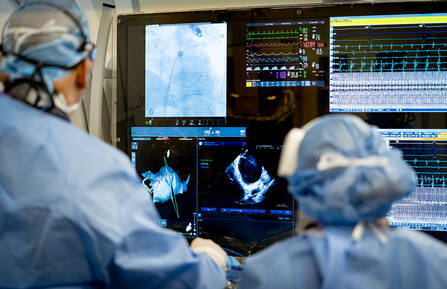When the heart requires medical attention, a "mechanic" sometimes is needed for structural problems, or perhaps a "plumber" is needed to address circulatory problems. In other situations, you might require an "electrician" or a cardiac electrophysiologic.
For more than 30 years, our advanced specialists in the rapidly evolving field of cardiac electrophysiology have been treating electromechanical disorders of the heart. They work with other experts in the Heart and Vascular Center to provide high-quality cardiac care.
Abnormal rhythms and electrical disorders of the heart
Our program offers effective treatment options for a wide variety of heart rhythm disorders, including:
- Expert evaluation and management of syncope, a sudden loss of consciousness that is sometimes associated with a heart rhythm disorder
- Treatment of abnormally fast heart rhythms using pharmaceuticals, cardiac electroceuticals, or ablation therapy
- Management of atrial fibrillation (or afib flutter), which is the most common cardiac dysrhythmia among adults in the United States. The condition is associated with impaired physical performance, thromboembolic stroke, and possibly heart failure. Our cardiac electrophysiologists offer multiple therapeutic options (singly and in combination), including expert medical management, catheter ablation, implantation of electroceuticals, and left atrial appendage closure.
- Dynamic electroanatomic mapping to guide catheter-based interventions for altering or eliminating defective tissue responsible for abnormal heart rhythms
- Implantation of pacemakers for treatment of unacceptably slow or unreliable heart rhythms, or to otherwise coordinate electrical impulses in the heart
- Placement of defibrillators for treatment of dangerous cardiac rhythms and restoration of a healthy heart rhythm
Cardiac Electrophysiology Ablation laboratory
Our Cardiac Electrophysiology Ablation laboratory allows the sharing of clinical data and images that support performance of complex electroanatomic procedures. The laboratory has a paired control room and procedure room that incorporate:
- Imaging technologies such as digital flouroscopy/angiography and intracardiac echocardiography, which enable real-time imaging of heart structures to assist in mapping and ablation procedures
- Two types of 3-dimensional electroanatomic mapping systems that support dynamic mapping and catheter navigation
- Catheter-based radio frequency ablation (using controlled electrical currents) and cryoablation (using intense cold) for a broad range of procedures that improve cardiac electroanatomic health
- Resources and equipment enabling high-level anesthesiology and surgical ancillary support
Cardiac Rhythm Device service
We offer a full range of services and electroceuticals to support cardiac device health, including:
- Implantation of a device to sense and correct potentially life-threatening heart rhythms
- Management of congestive heart failure with cardiac resynchronization therapy, which uses advanced pacing devices to send electrical impulses that coordinate and synchronize disparate regions of the heart
- Follow up for cardiac electroceuticals, including automated remote ("at home") follow-up
- Lead management and extraction for implantable cardiac devices, including lead troubleshooting, repositioning, replacement, and extraction
How our clinical research impacts your care
We have a history of innovation in the development of new and improved cardiac rhythm devices, catheter-based diagnostics, ablation techniques, and workflows. Our program works in partnership with the industry to help develop and evaluate new technologies for improving your care. One recent example is our ability to collect data remotely from implanted cardiac devices and transfer it directly into the electronic medical record, where all of our caregivers can access the information for your care.
